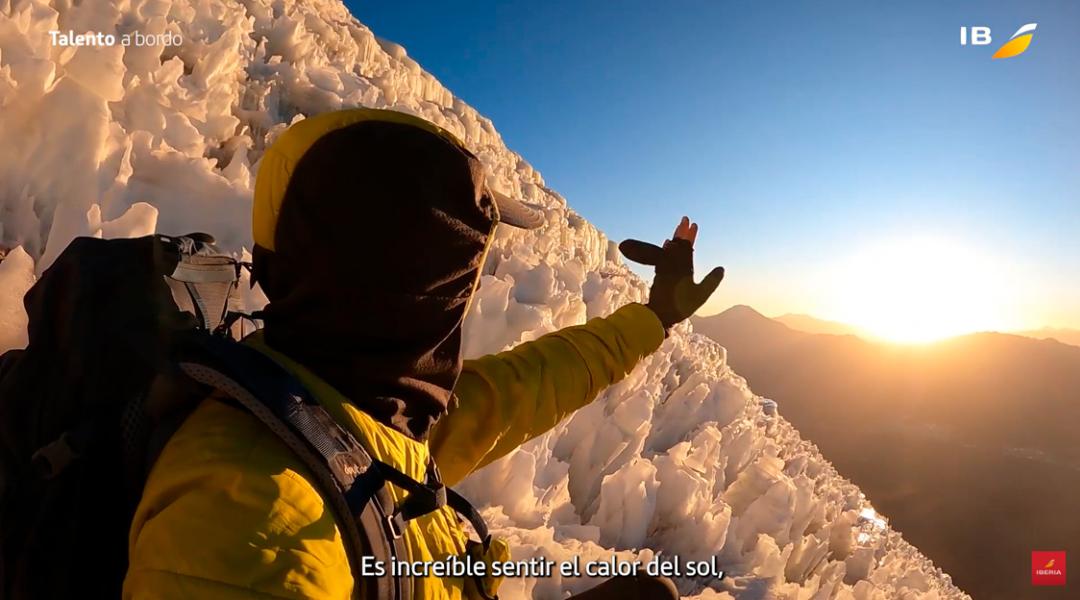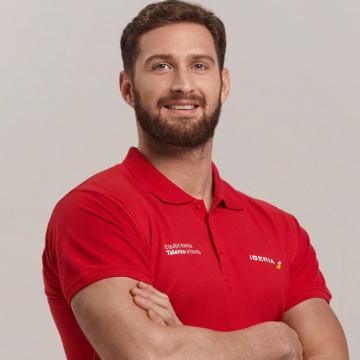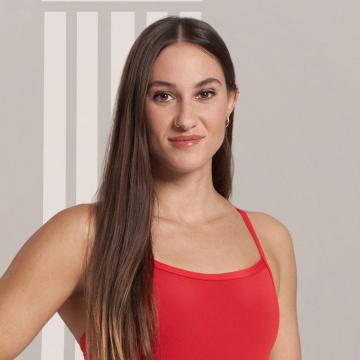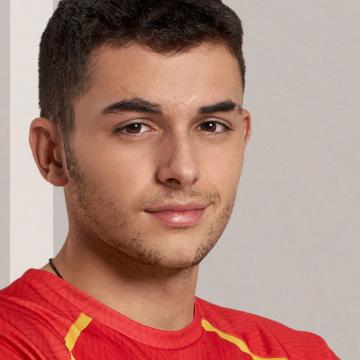Since opening on the 17th of April, Espacio Iberia has welcomed dozens of guests with one thing in common: their infinite talent. Talent that has inspired all the people who have sat there to listen to them.

This completely blind Paralympic athlete dreams of winning his third Paralympic gold medal in Paris and, to make that dream come true, he admits that mental health is just as important as physical health, if not more so. A graduate in Psychology, he defends the value of this science in sport and celebrates that what was previously considered a weakness has now become completely normal. “Psychologists need to be part of sports teams,” he assures us.
At the tender age of four, Gerard Descarrega (La Selva del Campo, 1994) was diagnosed with retinitis pigmentosa. His eyesight slowly deteriorated until it finally faded to black when he was 18. Now he’s completely blind. Without being mock-heroic, the two-time Paralympic champion of 400 meters (Río in 2016 and Tokyo in 2021) admits it was a tough blow that was hard to process. “Sport really helped me to recover psychologically,” declares Gerard, who learnt how to turn that ending into a new beginning, a spectacular career as a Paralympic athlete. But his relationship with athletics started earlier, “almost by process of elimination”, he remembers. At the age of 12, Gerard was already passionate about sports and, to be able to continue exercising despite his visual limitations, he chose the one that best fit his situation. That decision changed his life because athletics, he confesses, shaped him as a person: “It became the centre of my life. It’s given me many experiences, both good and bad. You’re your main rival, and that invites you to surpass yourself.” His next challenge: winning, alongside his guides —Guillermo Rojo and José María Marvizón— his third Paralympic gold in Paris. Obviously without giving up on his other great passion: climbing.
When you were 18 you lost your eyesight after it progressively deteriorating. How do you deal with such a blow?
When something like this happens to you, you need to process it slowly. It’s not an overnight process. Like anyone in that situation, my future seemed uncertain. I hadn’t planned on my life going the way it has. Of course, I wanted to be a Paralympic champion, but I knew it was really difficult. Sport really helped me to recover psychologically and the victories I achieved pushed me to carry on.
Just four years after losing your eyesight, you became a Paralympic champion in Río; what did that mean to you?
The gold medal is the epitome for any athlete. Río was my first final running completely blind —in London I ran the final in another category because I still had some eyesight—, and even though it was close, I won. It was a tremendous success, I was hoping to be in with a chance of winning a medal, but I never imagined I’d win the gold.
Gold in Río, gold in Tokyo, and gold in Paris? Which are your expectations?
I will be 30 in Paris, and I believe I’m at the perfect age, both physically and mentally. I also have a lot of experience in these kinds of competitions and I’m training as hard as I can to be on top form and, hopefully, win the title again.
“A guide must be humble enough to always put the blind athlete’s performance first, who’s the one who must give their all”
At the World Championships this summer you won silver and qualified for Paris. Is this a good result or are you frustrated at being just 21 hundredths of a second away from the gold?
I hoped to be in with a chance of winning and, despite the final not turning out as well as I’d hoped, I did. At the beginning, we were more conservative because we were keeping an eye on other rivals, which were supposedly stronger, but the Brazilian athlete [Felipe de Souza] got a good head start and we were a few metres behind him. It was slightly disappointing. What I’m frustrated about is not being on top form, I should’ve run a bit faster and that’s the only thing I reproach myself.
When you’re on the racetrack, you’re with your guides. What’s the key for a partnership to work out?
Certain personal and athletic circumstances must align, so it’s quite complicated. You have to train a lot together and you need to share comradery and good vibes. A guide must be humble enough to always put the blind athlete’s performance first, who’s the one who must give their all. And they need to step aside if they can’t keep the pace or are injured. Guille, for example, couldn’t be at the World Championships due to risk of injury, so José came with me to the 400-metre race. The three of us are a team.

Gerard Descarrega hopes to win another gold in Paris to go with his collection from Río and Tokyo.
Throughout your career, which has played a bigger role: talent or hard work?
Perseverance is essential in this sport, but you also need to be talented, which for me means having a series of innate skills. Putting in the same work, not everyone achieves the same results. My body, for example, has abilities that lend themselves well to the 400-metre race and that, together with a lot of hard work, gives me the chance to fight for medals.
There’s a lot of talk about mental health in sports. As an athlete and graduate in Psychology, do you think it’s equally as important as physical health?
100%. I’d even say that it’s one step above physical health because if you’re not mentally balanced, even if you train like crazy, you won’t perform well. In sports, it’s essential to feel good about yourself and have a healthy personal environment to be able to focus and be on top form physically. If not, it’s impossible. Now we look after our mental health more and it has become more normal. Many athletes go to the psychologist, whether in a clinical or athletic setting, and that could have been considered a weakness not too long ago. Psychologists need to be part of sports teams, just like nutritionists or physiotherapists.
“Now we look after our mental health more. Psychologists need to be part of sports teams”
You’ve reached the summit of the Aneto, Mont Blanc, and Mount Kenya. Where does your passion for mountains come from?
I’ve loved challenges and adventures since I was little. I’ve always practiced lots of outdoor sports in nature with my father and my friends. I’m passionate about mountains because climbing them is an experience that goes beyond reaching a summit and coming back down. It provides me with a lot of positive things that I then use in my day-to-day life. I’m lucky to be able to do these kinds of climbs.
You recently visited the Andes mountain range. Tell us about your experience.
The idea was to climb the Nevado Huascarán (Peru), but the route was blocked. So, we had to look for an alternative and we climbed the Chachani volcano in Arequipa (6,075 metres). We then went to Bolivia and were 200 metres away from reaching the summit of the Nevado Sajama (6,542 metres), because someone in our group got altitude sickness. It was a beautiful experience.
You’ve said that your dreams are beating the 400-metre race world record and reaching the summit of an eight-thousander. If you had to choose one, which would you choose?
Hopefully, I can achieve both but beating the 400-metre world record would be a bonus because it’s something I’ve been chasing for many years and I’m really close. The possibility of reaching the summit of an eight-thousander will always be there, but mountaineering isn’t my everyday life, it’s a fun pastime.


